
Workshop Report on International Cooperation
Workshop on Energy Conservation Collaboration for East Asia (ECC)
Sixth Workshop / 2012 (PDF)
Outline of the Sixth Workshop on Energy Conservation Collaboration for East Asia(ECC6) (PDF)
Fifth Workshop / 2011
・Outline of the Fifth Workshop on Energy Conservation Collaboration for East Asia (PDF)
・Updated Version of the EE & C Measures in Asian Countries (PDF)
Fourth Workshop / 2010
・Outline of the Fourth Workshop on Energy Conservation Collaboration for East Asia (PDF)
Summary of Energy Audit Results (PDF)
- China (National Energy Conservation Center, China)
- China (Materials Energy Conservation Center, China)
- India (Petroleum Conservation Research Association (PCRA))
- Malaysia (Malaysia Energy Center (PTM))
- Philippines (Energy Efficiency Practitioners Association of the Philippines, Inc. (ENPAP))
- Thailand (The Energy Conservation Center of Thailand (ECCT))
- Vietnam (Energy Conservation Center of Ha Noi (ECC-Ha Noi)
- Vietnam (Energy Conservation Center of Ho Chi Minh City (ECC-HCMC)
Updated Version of the EE & C Measures in Asian Countries (PDF)
Third Workshop / 2009
Outline of the Third Workshop on Energy Conservation Collaboration for East Asia (PDF)
Summary of Energy Audit Results (PDF)
- China (Materials Energy Conservation Center, China)
- India (Petroleum Conservation Research Association (PCRA))
- Malaysia (Malaysia Energy Center (PTM))
- Philippines (Energy Efficiency Practitioners Association of the Philippines, Inc. (ENPAP))
- Thailand (The Energy Conservation Center of Thailand (ECCT))
- Vietnam (Energy Conservation Center – Ho Chi Minh City (ECC-HCMC)
Updated Version of the EE & C Measures in Asian Countries (PDF)
Second Workshop / 2008
Outline of the Second Workshop on Energy Conservation Collaboration for East Asia (PDF)
First Workshop / 2007
First EAS Energy Conservation Training, Information Exchange MTG by ECCJ
PDF data
1. Agenda for 1st EE&C Collaboration Meeting
2. Energy intensity in industrial sub sector
3. Save Energy and Improve Energy Efficiency. (China)
4. Energy Efficiency & Conservation Goals and Action of Malaysia
5. Energy Efficiency and Conservation for the Philippines
6. Information Exchange – ECCJ, (Singapore)
7. First EAS Training Course Information Exchange. (Thailand)
8. Policies & Objectives of Energy Conservation & Efficiency Activiteis in Vietnam
Training & Seminar
Bi-national Cooperation
2008 (PDF)
Malaysia-4 | Thailand-5 | Vietnam-5 | India-5 | China-6 | Brunei-1 | China-7 | Thailand-6 | China-8 | India-6
2007 (PDF)
Malaysia-3 | Thailand-4 | China-3 | India-3 | Vietnam-4 | China-4 | Indonesia-4 | China-5 | India-4
2006
Thailand-3
’06 Thailand-3
Energy Conservation Training Programs for Developing Countries
Under the policy and support of the Japanese Government, ECCJ has been conducting energy conservation training programs for developing countries mainly in the Asian region for the purpose of promoting energy efficiency and conservation of those countries as well as enhancing the stable supply of energy of Japan. The programs include lectures, practical trainings at trial plants, factory tours, etc. aiming at transferring Japanese successful experiences and information (energy conservation policy, energy management, highly energy-efficient technology, etc.) for energy efficiency and conservation to those countries which could serve as useful reference for their planning/implementation/spread of energy efficiency and conservation.
ECCJ held the energy conservation training program for Thailand(ECTH-3) as following;
Number of participants;23 trainees from Thailand
Training term;July 3 – 13, 2006
Training site;Japan
A group photo of all trainees and some of trainers;
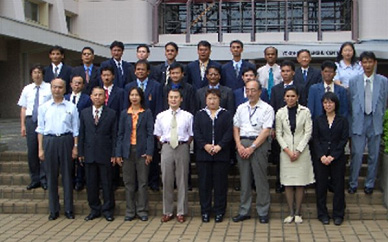
A snapshot photo at lecture;
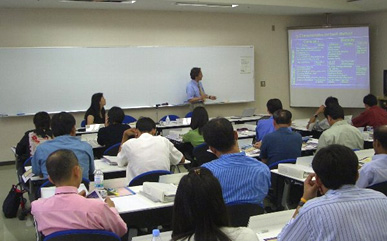
A snapshot photo at factory tour;
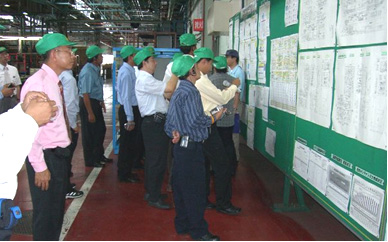
Vietnam-3
’06 Vietnam-3
Energy Conservation Training Programs for Developing Countries
Under the policy and support of the Japanese Government, ECCJ has been conducting energy conservation training programs for developing countries mainly in the Asian region for the purpose of promoting energy efficiency and conservation of those countries as well as enhancing the stable supply of energy of Japan. The programs include lectures, practical trainings at trial plants, factory tours, etc. aiming at transferring Japanese successful experiences and information (energy conservation policy, energy management, highly energy-efficient technology, etc.) for energy efficiency and conservation to those countries which could serve as useful reference for their planning/implementation/spread of energy efficiency and conservation.
ECCJ held the energy conservation training program for Vietnam as following;
Number of participants; 23 trainees from Vietnam
Training term; October 18 – 31, 2006
Training site; Japan
A group photo of all trainees and some of trainers
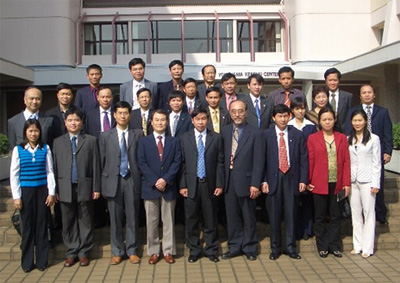
A snapshot photo at lecture;
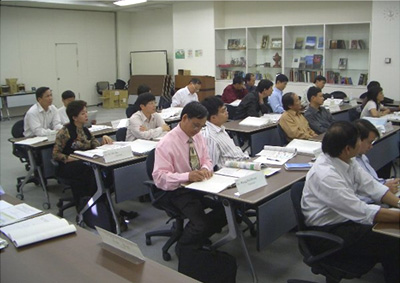
A snapshot photo at factory tour;
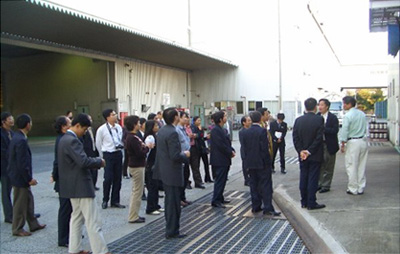
China-1
’06 China-1
Energy Conservation Training Programs for Developing Countries
Under the policy and support of the Japanese Government, ECCJ has been conducting energy conservation training programs for developing countries mainly in the Asian region for the purpose of promoting energy efficiency and conservation of those countries as well as enhancing the stable supply of energy of Japan. The programs include lectures, practical trainings at trial plants, factory tours, etc. aiming at transferring Japanese successful experiences and information (energy conservation policy, energy management, highly energy-efficient technology, etc.) for energy efficiency and conservation to those countries which could serve as useful reference for their planning/implementation/spread of energy efficiency and conservation.
ECCJ held the energy conservation training program for China as following;
Number of participants; 23 trainees from China
Training term; January 9 – 22, 2007
Training site; Japan
A group photo of all trainees and some of trainers
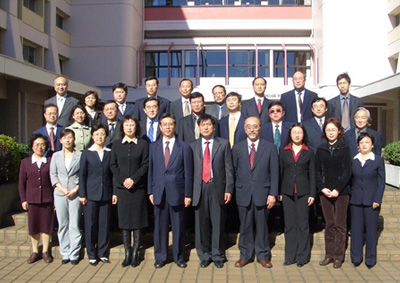
A group photo of all trainees and some of trainers
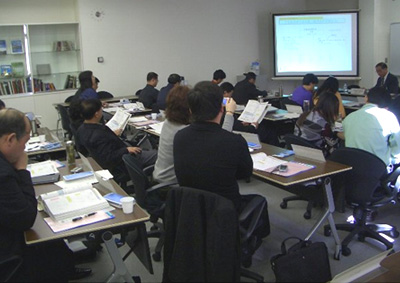
A group photo of all trainees and some of trainers
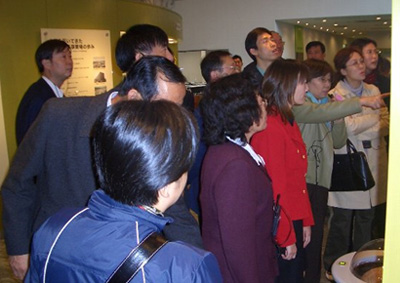
India-2
’06 India-2
Energy Conservation Training Programs for Developing Countries
Under the policy and support of the Japanese Government, ECCJ has been conducting energy conservation training programs for developing countries mainly in the Asian region for the purpose of promoting energy efficiency and conservation of those countries as well as enhancing the stable supply of energy of Japan. The programs include lectures, practical trainings at trial plants, factory tours, etc. aiming at transferring Japanese successful experiences and information (energy conservation policy, energy management, highly energy-efficient technology, etc.) for energy efficiency and conservation to those countries which could serve as useful reference for their planning/implementation/spread of energy efficiency and conservation.
ECCJ held the energy conservation training program for India as following;
Number of participants; 20 trainees from India
Training term; November 14 – 24, 2006
Training site; Japan
A group photo of all trainees and some of trainers
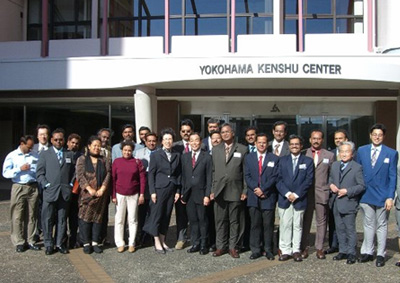
A snapshot photo at lecture;
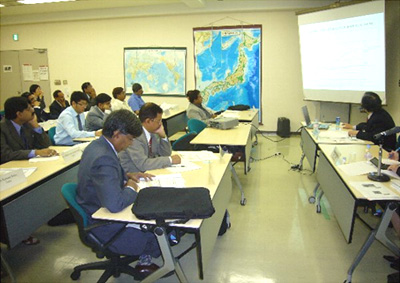
A snapshot photo at factory tour;
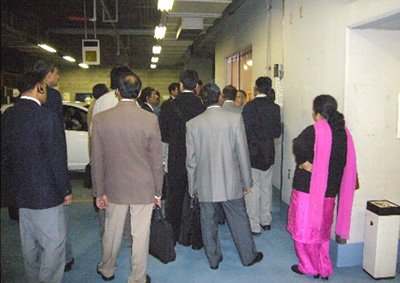
China-2
’06 China-2
Energy Conservation Training Programs for Developing Countries
Under the policy and support of the Japanese Government, ECCJ has been conducting energy conservation training programs for developing countries mainly in the Asian region for the purpose of promoting energy efficiency and conservation of those countries as well as enhancing the stable supply of energy of Japan. The programs include lectures, practical trainings at trial plants, factory tours, etc. aiming at transferring Japanese successful experiences and information (energy conservation policy, energy management, highly energy-efficient technology, etc.) for energy efficiency and conservation to those countries which could serve as useful reference for their planning/implementation/spread of energy efficiency and conservation.
ECCJ held the energy conservation training program for Chaina as following;
Number of participants; 32 trainees from Chaina
Training term; January 9 – 22, 2007
Training site; Japan
A group photo of all trainees and some of trainers
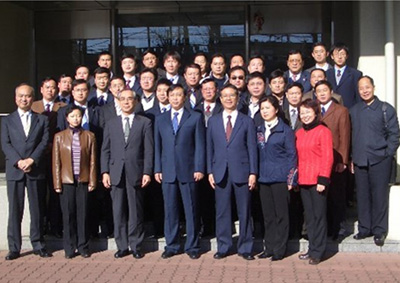
A snapshot photo at lecture;
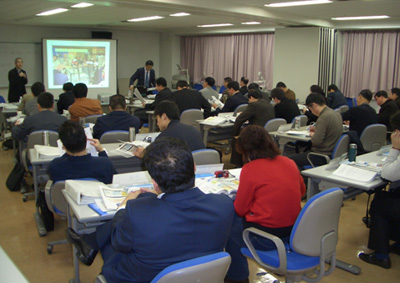
A snapshot photo at factory tour;
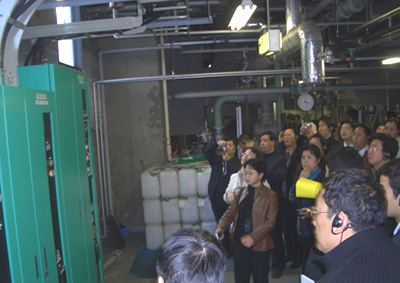
India-1
’06 India-1
Energy Conservation Training Programs for Developing Countries
Under the policy and support of the Japanese Government, ECCJ has been conducting energy conservation training programs for developing countries mainly in the Asian region for the purpose of promoting energy efficiency and conservation of those countries as well as enhancing the stable supply of energy of Japan. The programs include lectures, practical trainings at trial plants, factory tours, etc. aiming at transferring Japanese successful experiences and information (energy conservation policy, energy management, highly energy-efficient technology, etc.) for energy efficiency and conservation to those countries which could serve as useful reference for their planning/implementation/spread of energy efficiency and conservation.
ECCJ held the energy conservation training program for India as following;
Number of participants; 26 trainees from India
Training term; February 1 – 14, 2007
Training site; Japan
A group photo of all trainees and some of trainers
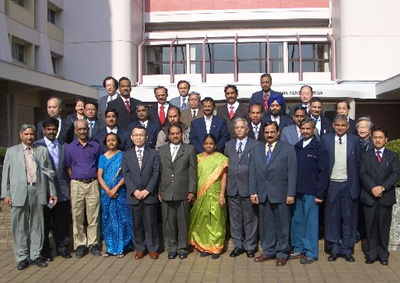
A snapshot photo at lecture;
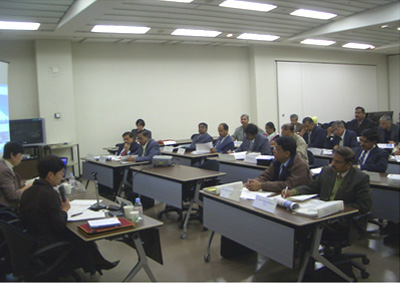
A snapshot photo at factory tour;
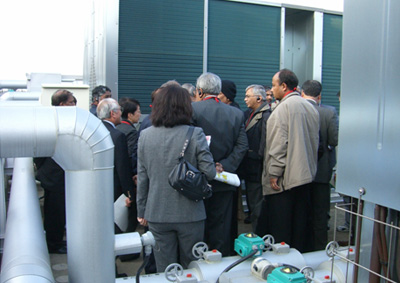
Indonesia-3
’06 Indonesia-3
Energy Conservation Training Programs for Developing Countries
Under the policy and support of the Japanese Government, ECCJ has been conducting energy conservation training programs for developing countries mainly in the Asian region for the purpose of promoting energy efficiency and conservation of those countries as well as enhancing the stable supply of energy of Japan. The programs include lectures, practical trainings at trial plants, factory tours, etc. aiming at transferring Japanese successful experiences and information (energy conservation policy, energy management, highly energy-efficient technology, etc.) for energy efficiency and conservation to those countries which could serve as useful reference for their planning/implementation/spread of energy efficiency and conservation.
ECCJ held the energy conservation training program for Indonesia as following;
Number of participants; 21 trainees from Indonesia
Training term; February 19 – 27, 2007
Training site; Japan
A group photo of all trainees and some of trainers
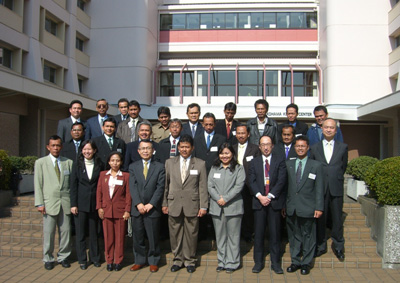
A snapshot photo at lecture;
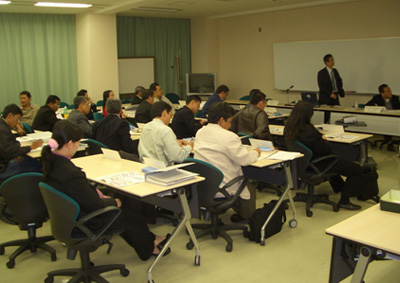
A snapshot photo at factory tour;
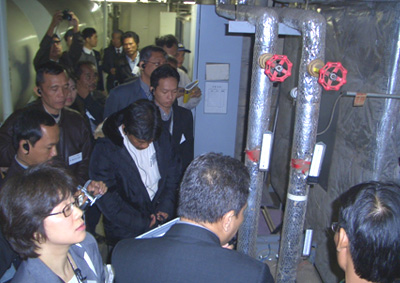
2005
Thailand
’05 Thailand
Energy Conservation Training Programs for Developing Countries
Under the policy and support of the Japanese Government, ECCJ has been conducting energy conservation training programs for developing countries mainly in the Asian region for the purpose of promoting energy efficiency and conservation of those countries as well as enhancing the stable supply of energy of Japan. The programs include lectures, practical trainings at trial plants, factory tours, etc. aiming at transferring Japanese successful experiences and information (energy conservation policy, energy management, highly energy-efficient technology, etc.) for energy efficiency and conservation to those countries which could serve as useful reference for their planning/implementation/spread of energy efficiency and conservation.
ECCJ held the energy conservation training program for Thailand as following;
Number of participants; 20 trainees from Thailand
Training term; May 16 – 27, 2005
Training site; Japan
A group photo of all trainees and some of trainers;
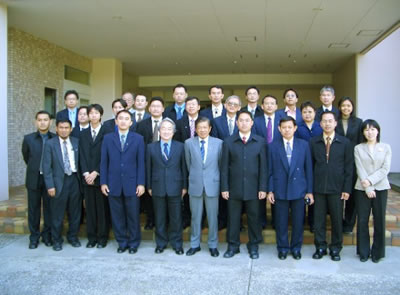
A snapshot photo at lecture;
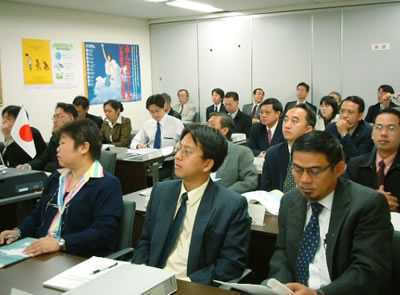
A snapshot photo at factory tour;
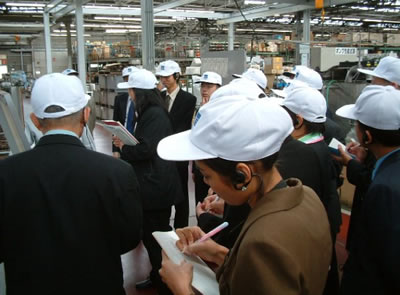
Thailand-2
Thailand-2
Energy Conservation Training Programs for Developing Countries
Under the policy and support of the Japanese Government, ECCJ has been conducting energy conservation training programs for developing countries mainly in the Asian region for the purpose of promoting energy efficiency and conservation of those countries as well as enhancing the stable supply of energy of Japan. The programs include lectures, practical trainings at trial plants, factory tours, etc. aiming at transferring Japanese successful experiences and information (energy conservation policy, energy management, highly energy-efficient technology, etc.) for energy efficiency and conservation to those countries which could serve as useful reference for their planning/implementation/spread of energy efficiency and conservation.
ECCJ held the energy conservation training program for Thailand as following;
Number of participants; 24 trainees from Thailand
Training term; February 8 -21, 2006
Training site; Japan Yokohama
A group photo of all trainees and some of trainers;
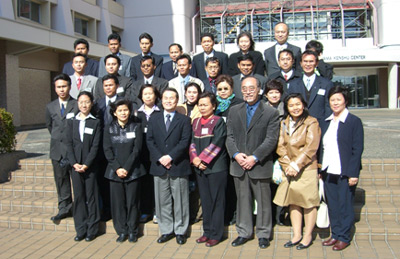
A snapshot photo at lecture;
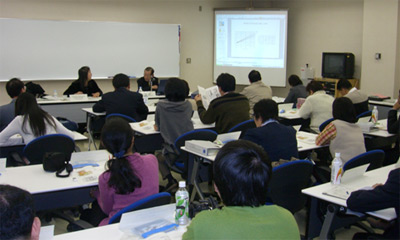
A snapshot photo at factory tour;
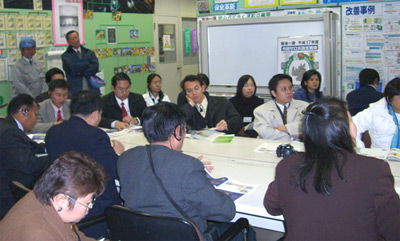
Vietnam
Vietnam
Energy Conservation Training Programs for Developing Countries
Under the policy and support of the Japanese Government, ECCJ has been conducting energy conservation training programs for developing countries mainly in the Asian region for the purpose of promoting energy efficiency and conservation of those countries as well as enhancing the stable supply of energy of Japan. The programs include lectures, practical trainings at trial plants, factory tours, etc. aiming at transferring Japanese successful experiences and information (energy conservation policy, energy management, highly energy-efficient technology, etc.) for energy efficiency and conservation to those countries which could serve as useful reference for their planning/implementation/spread of energy efficiency and conservation.
ECCJ held the energy conservation training program for Vietnam as following;
Number of participants; 24 trainees from Vietnam
Training term; August 29 – September 9, 2005
Training site; Japan
A group photo of all trainees and some of trainers;
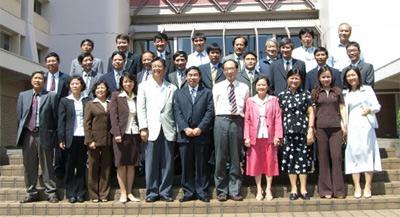
A snapshot photo at lecture;
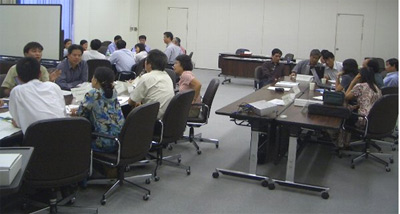
A snapshot photo at factory tour;
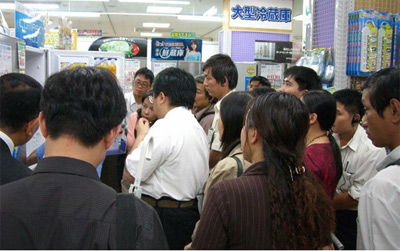
Philippine
Energy Conservation Training Programs for Developing Countries
Under the policy and support of the Japanese Government, ECCJ has been conducting energy conservation training programs for developing countries mainly in the Asian region for the purpose of promoting energy efficiency and conservation of those countries as well as enhancing the stable supply of energy of Japan. The programs include lectures, practical trainings at trial plants, factory tours, etc. aiming at transferring Japanese successful experiences and information (energy conservation policy, energy management, highly energy-efficient technology, etc.) for energy efficiency and conservation to those countries which could serve as useful reference for their planning/implementation/spread of energy efficiency and conservation.
ECCJ held the energy conservation training program for Philippine as following;
Number of participants; 19 trainees from Philippine
Training term; June 8 – 21, 2005
Training site; Japan
A group photo of all trainees and some of trainers;
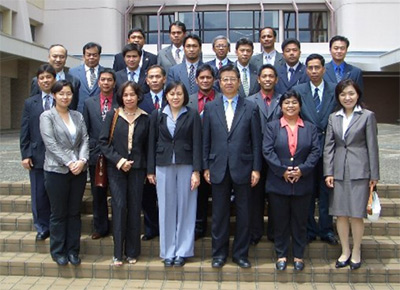
A snapshot photo at lecture;
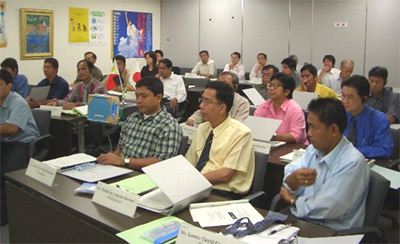
Indonesia
’05 Indonesia
Energy Conservation Training Programs for Developing Countries
Under the policy and support of the Japanese Government, ECCJ has been conducting energy conservation training programs for developing countries mainly in the Asian region for the purpose of promoting energy efficiency and conservation of those countries as well as enhancing the stable supply of energy of Japan. The programs include lectures, practical trainings at trial plants, factory tours, etc. aiming at transferring Japanese successful experiences and information (energy conservation policy, energy management, highly energy-efficient technology, etc.) for energy efficiency and conservation to those countries which could serve as useful reference for their planning/implementation/spread of energy efficiency and conservation.
ECCJ held the energy conservation training program for Indonesia as following;
Number of participants; 20 trainees from Indonesia
Training term; September 20 – 30, 2005
Training site; Japan
A group photo of all trainees and some of trainers;
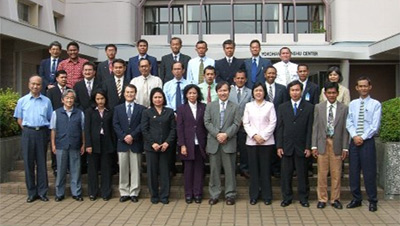
A snapshot photo at lecture;
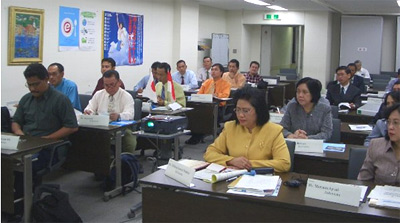
A snapshot photo at factory tour;
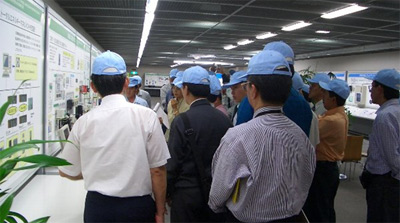
Malaysia
Malaysia
Energy Conservation Training Programs for Developing Countries
Under the policy and support of the Japanese Government, ECCJ has been conducting energy conservation training programs for developing countries mainly in the Asian region for the purpose of promoting energy efficiency and conservation of those countries as well as enhancing the stable supply of energy of Japan. The programs include lectures, practical trainings at trial plants, factory tours, etc. aiming at transferring Japanese successful experiences and information (energy conservation policy, energy management, highly energy-efficient technology, etc.) for energy efficiency and conservation to those countries which could serve as useful reference for their planning/implementation/spread of energy efficiency and conservation.
ECCJ held the energy conservation training program for Malaysia as following;
Number of participants; 21 trainees from Malaysia
Training term; January 10 – 19, 2006
Training site; Japan Tokyo
A group photo of all trainees and some of trainers;
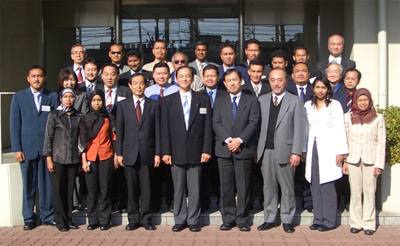
A snapshot photo at lecture;
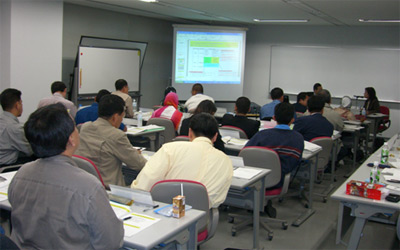
A snapshot photo at factory tour;
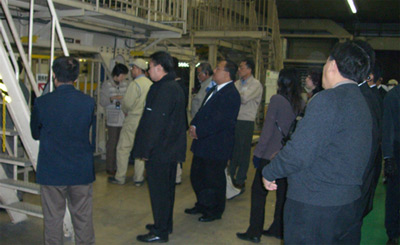
Multi-national Cooperation
Energy Conservation Training Programs for Developing Countries
Energy Conservation Training Programs for Developing Countries
Background:
The “Multi-Country Training Program on Energy Conservation for ASEAN Countries” (MTPEC) is funded by the Ministry of Economy, Trade and Industry (METI), Japan. The project is implemented by ECCJ on behalf of METI in cooperation with the Jakarta-based ASEAN Centre for Energy (ACE). ACE is an inter-governmental organization established in January 1999 by the 10 member nations of the Association of Southeast Asian Nations (ASEAN) to initiate, coordinate, and facilitate regional as well as joint and collective activities on energy.
Objectives:
Generally, the MTPEC program aims to enhance the cooperation between Japan and ASEAN Member Countries in the field of Energy Efficiency and Conservation (EE&C), achieving the following objectives:
(1) To provide participants from ASEAN governments, non-governmental and non-profit organizations with a clearer understanding of Japan’s policies and activities on energy conservation.
(2) To disseminate practical knowledge and experiences on the methodologies, techniques and approaches for energy management, energy conservation such as Top Runner Program and energy manager system of Japan, ESCO and so on.
(3) To learn EE&C best practices through site visits to be conducted at a best representative of the building or industry sector implementing EE&C programs. The participants are expected to collect as much “first-hand” information as possible and create ideas which they can share during the panel discussion.
(4) To provide learning opportunities to enhance the ASEAN participants’ understanding of the evolution and implementation of Japan’s energy manager / officer system that may find suitable application in the ASEAN member countries.
(5) To share and discuss the EE&C policies and action plans adopted by the ASEAN member countries.
(6) To identify the needs for a cooperation in EE&C between and among Japan and ASEAN countries.
ECCJ held the MTPEC programs as follows:
(1) 1st MTPEC program
-
- Number of Participants;
- 19 trainees from 10 ASEAN member countries
(Brunei Darussalam, Cambodia, Indonesia, Lao PDR, Malaysia,
Myanmar, Philippines,Singapore, Thailand and Vietnam) -
- Training term; July 25 – 29, 2005
-
- Training program; Table-1
-
- A group photo of all trainees and some of trainers; Fig-1
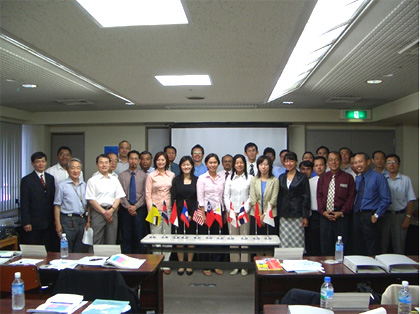
Fig.-1 Group Photo of MTPEC01
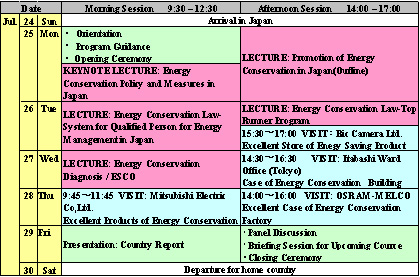
Table-1 Training Program of MTPEC01
(2) 2nd MTPEC program
-
- Number of Participants;
21 trainees from 6 ASEAN member countries (Indonesia, Malaysia, Philippines, Singapore, Thailand and Vietnam)
- Number of Participants;
-
- Training term; November 24 – December 2, 2005
-
- Training program; Table-2
-
- A group photo of all trainees and some of trainers; Fig-2
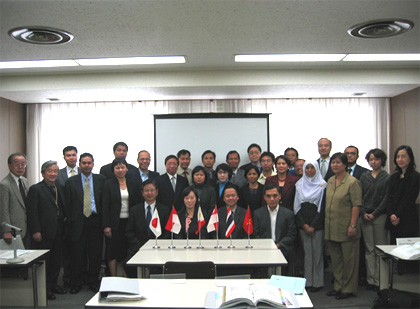
Fig.-2 Group Photo of MTPEC02
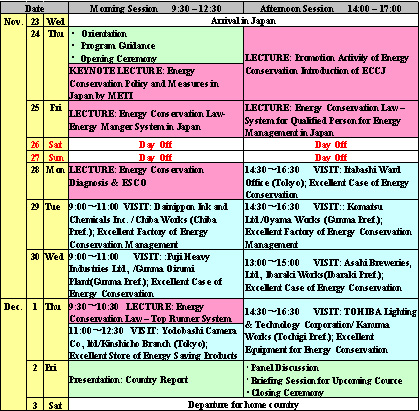
Table-2 Training Program of MTPEC02
(3) 3rd MTPEC program
-
- Number of Participants;
24 trainees from 7 ASEAN member countries
(Brunei Darussalam, Cambodia, Indonesia, Lao PDR, Myanmar,Philippines, and Vietnam)
- Number of Participants;
-
- Training term; January 12 – 20, 2006
-
- Training program; Table-3
-
- A group photo of all trainees and some of trainers; Fig-3
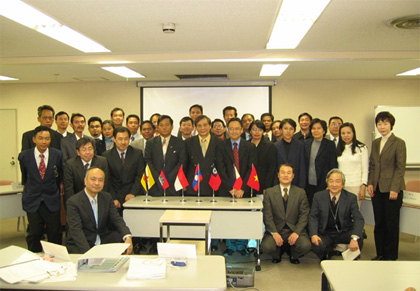
Fig.-3 Group Photo of MTPEC03
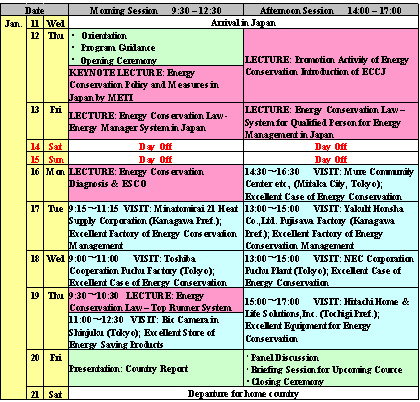
Table-3 Training Program of MTPEC03
(4) 4th MTPEC program
-
- Number of Participants;
25 trainees from 10 ASEAN member countries
(Brunei Darussalam, Cambodia, Indonesia, Lao PDR, Malaysia, Myanmar, Philippines, Singapore, Thailand and Vietnam)
- Number of Participants;
-
- Training term; February 6 – 17, 2006
-
- Training program; Table-4
-
- A group photo of all trainees and some of trainers; Fig-4
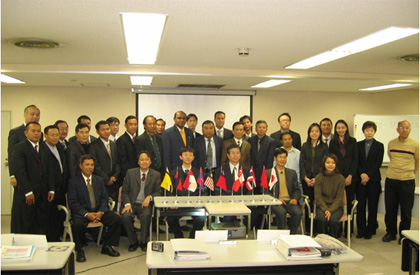
Fig.-4 Group Photo of MTPEC04
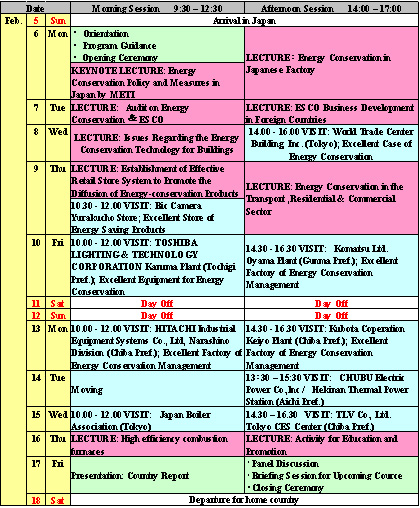
Table-4 Training Program of MTPEC04
(5) 5th MTPEC program
-
- Number of Participants;
21 trainees from 10 ASEAN member countries
(Brunei Darussalam, Cambodia, Indonesia, Lao PDR, Malaysia, Myanmar, Philippines, Singapore, Thailand and Vietnam)
- Number of Participants;
-
- Training term; August 24 – September 1, 2006
-
- Training program; Table-5
-
- A group photo of all trainees and some of trainers; Fig-5
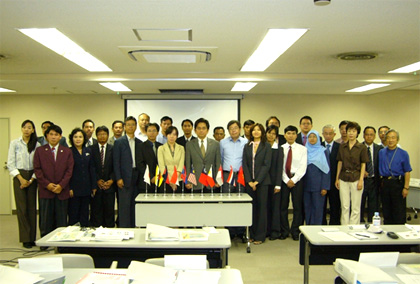
Fig.-5 Group Photo of MTPEC05
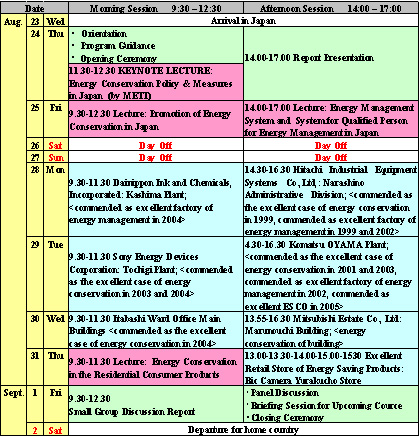
Table-5 Training Program of MTPEC05
(6) 6th MTPEC program
-
- Number of Participants;
20 trainees from 10 ASEAN member countries
(Brunei Darussalam, Cambodia, Indonesia, Lao PDR, Malaysia, Myanmar, Philippines, Singapore, Thailand and Vietnam)
- Number of Participants;
-
- Training term; January 31 – February 8, 2007
-
- Training program; Table-6
-
- A group photo of all trainees and some of trainers; Fig-6
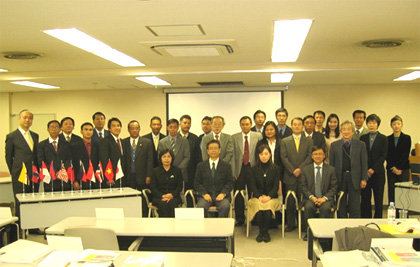
Fig.-6 Group Photo of MTPEC06
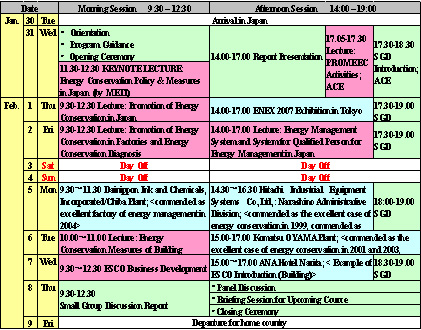
Table-6 Training Program of MTPEC06
(7) 7th MTPEC program
-
- Number of Participants;
23 trainees from 10 ASEAN member countries
(Cambodia, Indonesia, Lao PDR, Malaysia, Myanmar, Philippines, Singapore, Thailand and Vietnam)
- Number of Participants;
-
- Training term; September 3 – 7, 2007
-
- Training program; Table-7
-
- A group photo of all trainees and some of trainers; Fig-7
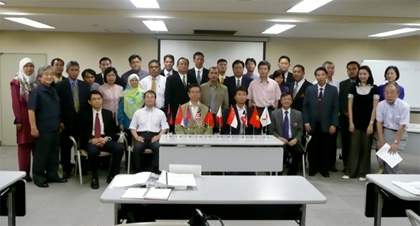
Fig.-7 Group Photo of MTPEC07
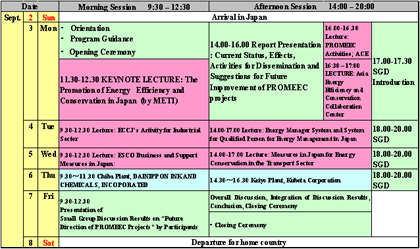
Table-7 Training Program of MTPEC07
(8) 8th MTPEC program
-
- Number of Participants;
32 trainees from 9 ASEAN member countries
(Brunei, Cambodia, Indonesia, Lao PDR, Malaysia, Myanmar, Singapore, Thailand and Vietnam)
- Number of Participants;
-
- Training term; January 17 – 25, 2008
-
- Training program; Table-8
-
- A group photo of all trainees and some of trainers; Fig-8
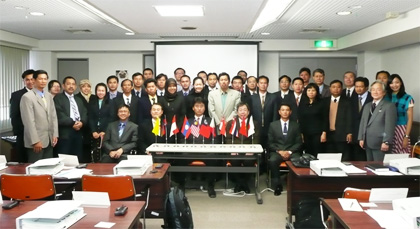
Fig.-8 Group Photo of MTPEC08
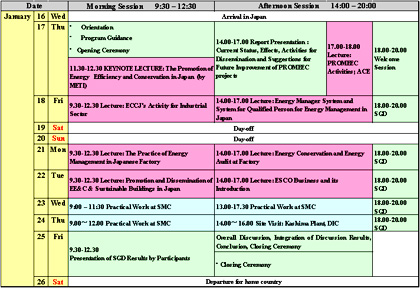
Table-8 Training Program of MTPEC08
(9) 9th MTPEC program
-
- Number of Participants;
32 trainees from 10 ASEAN member countries
(Brunei, Cambodia, Indonesia, Lao PDR, Malaysia, Myanmar, Philippines, Singapore, Thailand and Vietnam)
- Number of Participants;
-
- Training term; October 9 – 17, 2008
-
- Training program; Table-9
-
- A group photo of all trainees and some of trainers; Fig-9
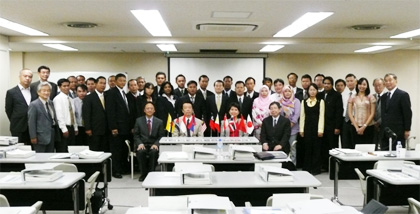
Fig.-9 Group Photo of MTPEC09
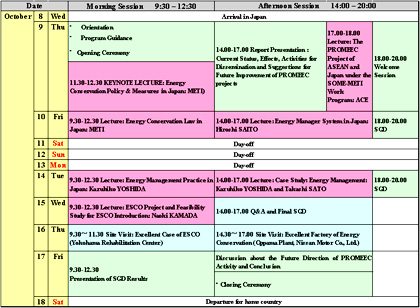
Table-9 Training Program of MTPEC09
2006-2007
PROMEEC (Major Industries) 2006-2007
Attachment
(II) Lao PDR
(1) Cement Process Lecture(Lao Cement)
(2) Promotion of Energy Conservation Activities in Factories (Electricity)
(3) Lao Cement Audit Report
(4)1 LA_Khamso-presentation – Promeec 2006
(4)2 H18-1 Initiatives & Programs of ECCJ
(4)3 LA_Mr.Vanthong presentation – PROMEEC in LAOS [batch-1]
(4)4 Malaysia Speaker1
(4)6 PH_promeec industry present phils.
(4)7 Lao Cement Audit Results (Seminar)
(4)8 Barriers Measures (Seminar)
(III) Thailand
(1)1 Overview for Thailand Steel Industry
(1)2 Overview of Japan Steel Industry
(1)3 Malaysia PROMEEC_Thailand
(1)4 Indonesia Presentation Thailandt
(1)5 Phils steel and iron Presentation in Thailand
(1)6 ECCJ Mr. Takeda Presentation Nov17
(1)7 H18-Thai BSI Presentation copy
(1)8 H18-Thai 061117 Seminar Comments
(1)9 Technical directory PROMEEC-Thailand
(1)10 PROMEEC Building Database
(IV) Myanmar
11-ACE_overview EE&C presentation
12-H18-1 Initiatives & Programs of ECCJ
13-MM_PROMEEC Industry2006
14-ID_Energy Conservation SB
15-MY_PROMEECMyanmar
16-VN_Hai duong
17-MM_5HHK(LAOS Presentation)2
18-MM_ENERGY AUDIT_Thanlyin Oil Refinery
19-MM Kyankhin Cement
20-H18-Myanmar 061124 Seminar Comments R1
21-Barriers & Measures
22-ACE_Technical directory PROMEEC
23-ACE_PROMEEC Building Database
Myanmar Cement Process Lecture-1
Myanmar(English)TAKEDA .06.11.24′
(V) PostWorkshop
(1)1 J01Nuibe speech
(1)2 J02Kawase SW Industry FY2005 Activities
(1)3 J03Kawase SW Industry FY2006 Plan
(1)4 J04 SW (Building) Results of Activities 06-07
(1)5 J05 SW (Building) Future Plan 07-08
(1)6 J06 SW(EM) Resuls 06-07
(1)7 J07 SW(EM) Updated ASEAN EM System Plan
(1)8 J07A Plan of Award System (EM)
(1)9 J08 SW (EM) Future Plan R1
(1)10 J09 PW Achievement & Plan
(2)1 LA_PROMEEC Industry of Lao PDR
(2)2 MM_Review of EE&C Activities
(2)3 TH_PROMEEC Thailand 2006 summary
(2)4 ACE_PROMEEC – Industry Database 2007 Rev1
(2)5 ACE_Ivan-TD presentation
(2)6 J07 Plan of Award System (EM)
